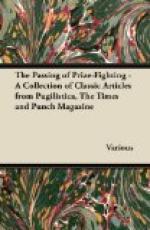One knows well enough, alas, how the temptation to spiritual drug-taking has grown as the result of the accumulated sorrows of these past years, but it is not well that such a treatment of the eternal question should be taken seriously. Is this sort of thing really better than the harp-and-cloud theory? It is not. One looked in vain for any trace of real vision, any true sense of the height and depth of the problem.
Mr. MARSHALL struggled quite manfully with the part of Anthony, and of course he had his moments. I hope so good a player is not developing the “actor’s pause,” of which I detected signs. Miss IRENE ROOKE had nothing in particular to do and did it very well. Mr. HUBERT HARBEN as the impenitent profiteer from Lancashire, Anthony’s brother-in-law, was better suited than I have seen him for some time, and provided the very necessary relief. The precocious children infuriated me, but that is purely temperamental. The actors who played the parts of those who had “crossed” were wrapped in such an atmosphere of gloom, to the strains of such meretricious music that (on the evidence) I can only advise people to defer their crossing as long as possible; a thing they will doubtless do, even if they have a friendlier feeling to the new religion than I can command.... I am afraid I proved a bad sailor.
T.
* * * * *
TWO STUDIES IN MUSICAL CRITICISM.
(With grateful acknowledgments to “The Times” and “The Morning Post.")
I.
We had quite a hectic time at the Philharmonic—I nearly wrote the Phillemonade—concert last night, what with two Czechs, Dabcik and Ploffskin, slabs of WAGNER, and Carl Walbrook’s Humorous Variations, “The Quangle Wangle,” conducted by Carl himself. If the honest truth be told, we sat down to the Variations with no more pleasurable anticipation than one sits down with in the dentist’s chair, preparatory to the application of gags, electric drills and other instruments of odontological torture. (Strange, by the way, that no modernist has translated the horrors of the modern Tusculum into terms of sound and fury!) But we were most agreeably surprised to find ourselves following every one of the forty-nine Variations with breathless interest. Mr. Walbrook is indeed a case of the deformed transformed. We found hardly a trace of the poluphloisboisterous pomposity with which he used to camouflage his dearth of ideas. His main theme is shapely and sinuous, and its treatment in most of the Variations titillated us voluptuously. But, since it is the function of the critic to criticise, let us justify our role by noting that the scoring throughout tends to glutinousness, like that of the pre-war Carlsbad plum; further, that a solo on the muted viola against an accompaniment of sixteen sarrusophones is only effective if the sarrusophones are prepared to roar like sucking-doves, which, as LEAR would have said, “they seldom if ever do.” Still, on the whole the Variations arrided us vastly.




